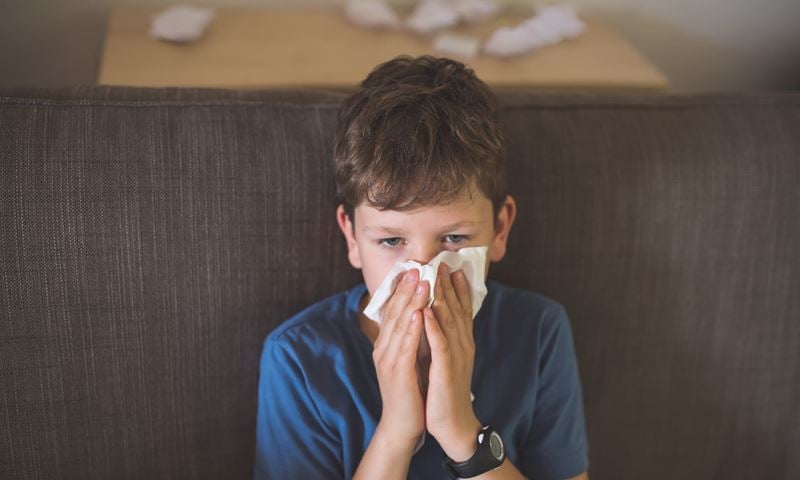Influenza or ‘the flu’ is a very contagious infection of the airways. The influenza vaccination, more commonly known as a flu vax, is the best protection against influenza and the most important way we can reduce the number of flu infections and deaths. Here, we explore some of the common myths about getting the flu vax.
1. I got vaccinated last year, I’m still protected... aren’t I?
The flu virus changes each year, which means the composition of the vaccine changes too. The only way to make sure you’re immunised against each year’s strain is to have a new flu vax each year. Also, the effectiveness of the vaccine diminishes over time, so being immunised from April will provide protection through to the peak Australian flu period from June to September.
2. The vaccine will give me the flu
This is a common misconception – but you can’t actually get the flu from the flu vaccine. The vaccine does not contain a live virus. All influenza vaccines used in Australia are made from the deactivated 'shell' of the flu virus.
You may experience some side effects similar to symptoms of the flu such as fever, tiredness and muscle aches. These side effects are common and mean that the vaccine is working as it’s triggering your body’s immune response. If symptoms don’t subside in one to two days, make sure you see your GP.
3. If I wash my hands and take my vitamins, I’ll avoid getting the flu.
In Australia, influenza on average causes 18,000 hospitalisations and 300,000 GP consultations each year. Washing your hands is an important part of minimising the spread of germs. As well as maintaining proper hygiene, getting an annual flu vax is the most effective way to prevent the flu and its complications.
4. The flu can’t be that bad – isn’t it just like getting a bad cold?
Influenza is more than just a common cold, and is a significant cause of illness and even death in Australia. The flu can lead to:
- bronchitis
- croup
- pneumonia

- ear infections
- heart and other organ damage
- brain inflammation and brain damage.
People with serious cases of the flu may need to go to hospital and have extended time periods off work or needing care and assistance.
5. Can’t I just take some antibiotics to fix me?
The flu is viral, which means it cannot be treated with antibiotics. If you think you have the flu, you should see your doctor. They will check your symptoms, ask about contact with other flu infected people and swab your nose or throat, or take a blood sample, to test for the virus. This also helps health officials track disease patterns.
It’s important to follow your doctor’s advice for recovery. Usually treatment is bed rest, drinking lots of fluids especially water, taking paracetamol to reduce pain and fever and using decongestant medications.
6. I’m allergic to eggs so I can’t have the vaccine.
People with egg allergy, including anaphylaxis can still safely have the flu vaccine. It’s recommended that you get your flu vax done in a medical facility like your GP clinic just to be safe.
However there are other or medical reasons to not have a flu vax and these include:
- anaphylaxis after a previous dose of flu vaccine
- anaphylaxis to another vaccine component
- sensitivity or allergy to latex excludes using one type of vaccine. Talk to your GP for more information.
7. It’s too expensive
Flu vax is provided free to some people in Australia through the National Immunisation Program. Eligibility is for those most at risk of contracting the flu. These groups are:
- all Aboriginal and Torres Strait Islander people aged 6 months and over
- pregnant women (during any stage of pregnancy)
- all people aged 65 years and over
- people aged six months and over with medical conditions which increase the risk of influenza disease complications.
Some workplaces provide it for free or at a subsidised rate.
Talk to your workplace, your GP, community health centre, Aboriginal medical services or local immunisation provider for more information on how to access the flu vax.
8. I’ve had my flu vax. Now I’m 100% protected against getting the flu.
At this point the flu vax is not 100% effective. But the high level of protection it does provide makes it a worthwhile annual vaccination. It can also reduce the severity of symptoms in those who do get sick.
The flu is highly contagious so always wash your hands, avoid contact with people who have the flu, stay home while you’re unwell and avoid sharing linens, eating utensils and dishes with those you live with. When coughing, use a tissue and dispose of it immediately or ‘catch’ your cough in your sleeve or elbow.
For more information about how to prevent, manage and identify the flu:



